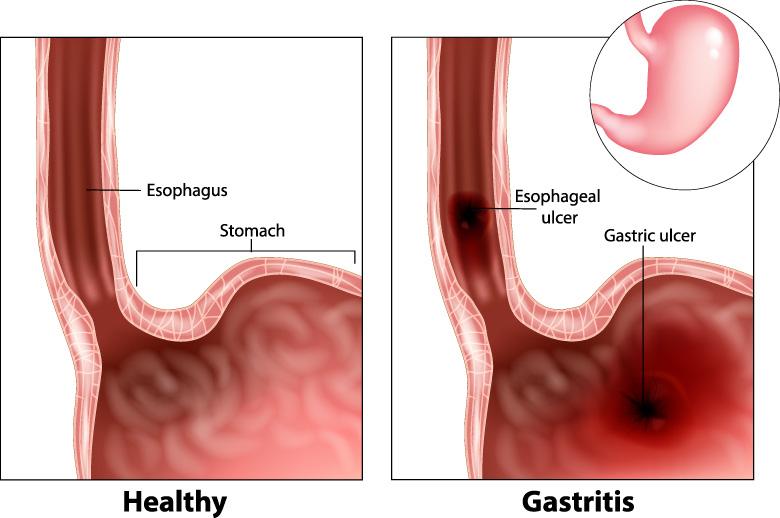
胃炎
什么是胃炎?
胃炎是指胃粘膜肿胀。胃粘膜发炎时,可能会导致肚子痛、胃灼热、恶心和呕吐等症状。
胃炎的类型
胃炎有 4 种类型:
胃炎有哪些症状?
在大多数情况下,胃炎不会表现出任何症状。不过,最常见的胃炎症状包括:
- 呕吐物带血
- 出血导致的黑便
- 上腹部灼烧感(腹部)
- 上腹部疼痛
- 恶心和消化不良
- 食欲不振
- 体重减轻
- 呕吐
- 打嗝
胃炎的病因是什么?
胃炎可能由以下原因引起:
- 过量饮酒
- 术后、烧伤或创伤性受伤
- 幽门螺杆菌引起的感染,该细菌会削弱胃的保护层,导致酸性消化液与胃壁发生接触
- 长期使用非甾体抗炎药 (NSAID),例如阿司匹林和布洛芬
- 应激和慢性呕吐,例如暴食症病例
胃炎的风险因素有哪些?
以下因素会增加您发生胃炎的风险:
- 细菌感染 – 幽门螺杆菌(一种进入机体后在消化系统定植的细菌)引起的感染,可发展为胃炎。
- 过量饮酒 – 过量饮酒会刺激和侵蚀胃粘膜,使胃分泌更多消化液。这可导致急性胃炎。
- 频繁使用止痛药 – 经常使用常见止痛药(如阿司匹林、布洛芬和萘普生)可能会减少有助于保护胃粘膜的物质。这可导致急性或慢性胃炎。
- 应激 – 由受伤、大手术或重度感染引起的极端应激可导致急性胃炎。
- 其他病况 – 如果您患有自身免疫性疾病(如桥本氏病和 1 型 糖尿病),您患胃炎的风险会增加。患有克罗恩病、HIV/AIDS 和寄生虫感染等疾病的患者也更容易出现胃炎。
- 年龄 – 由于胃粘膜往往随着年龄的增长而变薄,老年人患胃炎的风险更高。老年人也更容易出现导致胃炎的其他因素,例如幽门螺杆菌感染和自身免疫性疾病。
胃炎有哪些并发症和相关疾病?
如不治疗,胃炎可能会导致以下健康问题:
贫血
某些胃炎病例会导致胃肠道出血。这可能会导致 贫血,一种红细胞总量减少的疾病。贫血可导致气促、无力和头晕。
恶性贫血
自身免疫性问题引起的胃炎可能不利于机体对维生素 B12 的吸收。维生素 B12 缺乏可能导致恶性贫血,这会让您感觉无力和出现手脚麻木。
腹膜炎
当胃炎导致胃溃疡加重时,胃内容物可能会溢入腹部。这可能会造成细菌扩散并导致腹膜炎,即一种腹壁内侧粘膜发生的炎症。腹膜炎可导致一种危及生命的炎症,称为脓毒症。
胃癌
幽门螺杆菌和自身免疫性问题引起的胃炎可导致胃粘膜赘生物,从而增加发生 胃癌 的风险。
如何预防胃炎?
您可通过保持良好的卫生习惯和健康的生活方式来预防胃炎。一般而言,您应该:
- 避免酸性和高脂食物。
- 避免服用非甾体抗炎药。
- 少量多餐,避免暴饮暴食。
- 正确洗手,避免幽门螺杆菌感染。
- 食用经过适当烹饪的食物,避免幽门螺杆菌感染。
- 学会正确处理压力。
- 少喝酒。
- 减少咖啡因摄入量。
This coverage checker is brought to you by Health Insured, an online resource that helps you understand your health coverage in Singapore.
本页面已经过我们的医疗内容审核员审核。






